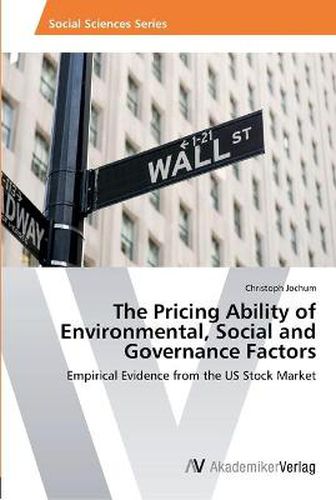Readings Newsletter
Become a Readings Member to make your shopping experience even easier.
Sign in or sign up for free!
You’re not far away from qualifying for FREE standard shipping within Australia
You’ve qualified for FREE standard shipping within Australia
The cart is loading…






This title is printed to order. This book may have been self-published. If so, we cannot guarantee the quality of the content. In the main most books will have gone through the editing process however some may not. We therefore suggest that you be aware of this before ordering this book. If in doubt check either the author or publisher’s details as we are unable to accept any returns unless they are faulty. Please contact us if you have any questions.
Overuse of resources, increasing shortages of food, climate change, environmental pollution as well as numerous high-profile corporate governance scandals are examples that unsustainable economic activities constitute a threat to the well-being of humanity. As a consequence, the way we’re doing business and the way we invest will change fundamentally in order to find a sustainable solution. The financial market crisis has shown that it is no longer enough to simply consider the three dimensions risk, return and liquidity. New aspects have to find their way into the classical investment world. A concept, which was integrated into the capital markets during the last years is the concept of socially responsible or sustainable and responsible investments (SRI). In the meantime, all around the globe the number and diversity of market participants offering a wide range of products and services are steadily growing. Alongside with this growth and interest, SRI is evolving and is getting more and more complex. Therefore, much more research is needed to become more convincing and viable in the future. This paper further investigates the impact of environmental, social and governance (ESG) issues on stock prices, while answering the question Are environmental, social and governance factors relevant for asset pricing? .
$9.00 standard shipping within Australia
FREE standard shipping within Australia for orders over $100.00
Express & International shipping calculated at checkout
Stock availability can be subject to change without notice. We recommend calling the shop or contacting our online team to check availability of low stock items. Please see our Shopping Online page for more details.
This title is printed to order. This book may have been self-published. If so, we cannot guarantee the quality of the content. In the main most books will have gone through the editing process however some may not. We therefore suggest that you be aware of this before ordering this book. If in doubt check either the author or publisher’s details as we are unable to accept any returns unless they are faulty. Please contact us if you have any questions.
Overuse of resources, increasing shortages of food, climate change, environmental pollution as well as numerous high-profile corporate governance scandals are examples that unsustainable economic activities constitute a threat to the well-being of humanity. As a consequence, the way we’re doing business and the way we invest will change fundamentally in order to find a sustainable solution. The financial market crisis has shown that it is no longer enough to simply consider the three dimensions risk, return and liquidity. New aspects have to find their way into the classical investment world. A concept, which was integrated into the capital markets during the last years is the concept of socially responsible or sustainable and responsible investments (SRI). In the meantime, all around the globe the number and diversity of market participants offering a wide range of products and services are steadily growing. Alongside with this growth and interest, SRI is evolving and is getting more and more complex. Therefore, much more research is needed to become more convincing and viable in the future. This paper further investigates the impact of environmental, social and governance (ESG) issues on stock prices, while answering the question Are environmental, social and governance factors relevant for asset pricing? .